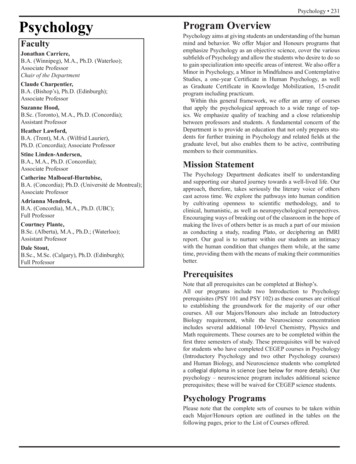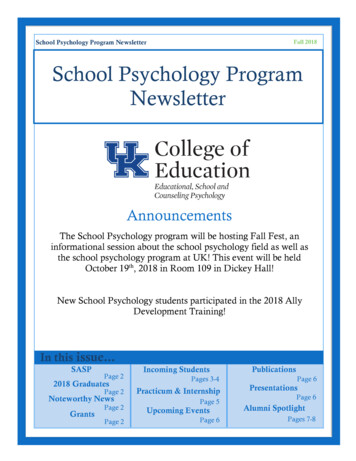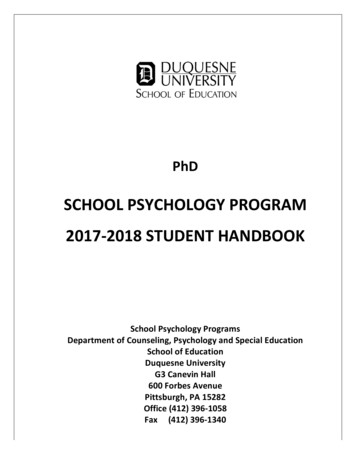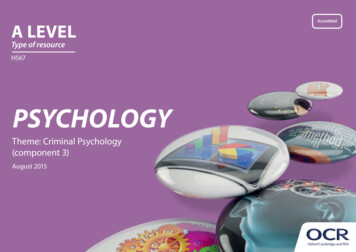
Transcription
Psychology 231PsychologyFacultyJonathan Carriere,B.A. (Winnipeg), M.A., Ph.D. (Waterloo);Associate ProfessorChair of the DepartmentClaude Charpentier,B.A. (Bishop’s), Ph.D. (Edinburgh);Associate ProfessorSuzanne Hood,B.Sc. (Toronto), M.A., Ph.D. (Concordia);Assistant ProfessorHeather Lawford,B.A. (Trent), M.A. (Wilfrid Laurier),Ph.D. (Concordia); Associate ProfessorStine Linden-Andersen,B.A., M.A., Ph.D. (Concordia);Associate ProfessorCatherine Malboeuf-Hurtubise,B.A. (Concordia); Ph.D. (Université de Montreal);Associate ProfessorAdrianna Mendrek,B.A. (Concordia), M.A., Ph.D. (UBC);Full ProfessorCourtney Plante,B.Sc. (Alberta), M.A., Ph.D.; (Waterloo);Assistant ProfessorDale Stout,B.Sc., M.Sc. (Calgary), Ph.D. (Edinburgh);Full ProfessorProgram OverviewPsychology aims at giving students an understanding of the humanmind and behavior. We offer Major and Honours programs thatemphasize Psychology as an objective science, cover the varioussubfields of Psychology and allow the students who desire to do soto gain specialization into specific areas of interest. We also offer aMinor in Psychology, a Minor in Mindfulness and ContemplativeStudies, a one-year Certificate in Human Psychology, as wellas Graduate Certificate in Knowledge Mobilization, 15-creditprogram including practicum.Within this general framework, we offer an array of coursesthat apply the psychological approach to a wide range of topics. We emphasize quality of teaching and a close relationshipbetween professors and students. A fundamental concern of theDepartment is to provide an education that not only prepares students for further training in Psychology and related fields at thegraduate level, but also enables them to be active, contributingmembers to their communities.Mission StatementThe Psychology Department dedicates itself to understandingand supporting our shared journey towards a well-lived life. Ourapproach, therefore, takes seriously the literary voice of otherscast across time. We explore the pathways into human conditionby cultivating openness to scientific methodology, and toclinical, humanistic, as well as neuropsychological perspectives.Encouraging ways of breaking out of the classroom in the hope ofmaking the lives of others better is as much a part of our missionas conducting a study, reading Plato, or deciphering an fMRIreport. Our goal is to nurture within our students an intimacywith the human condition that changes them while, at the sametime, providing them with the means of making their communitiesbetter.PrerequisitesNote that all prerequisites can be completed at Bishop’s.All our programs include two Introduction to Psychologyprerequisites (PSY 101 and PSY 102) as these courses are criticalto establishing the groundwork for the majority of our othercourses. All our Majors/Honours also include an IntroductoryBiology requirement, while the Neuroscience concentrationincludes several additional 100-level Chemistry, Physics andMath requirements. These courses are to be completed within thefirst three semesters of study. These prerequisites will be waivedfor students who have completed CEGEP courses in Psychology(Introductory Psychology and two other Psychology courses)and Human Biology, and Neuroscience students who completeda collegial diploma in science (see below for more details). Ourpsychology – neuroscience program includes additional scienceprerequisites; these will be waived for CEGEP science students.Psychology ProgramsPlease note that the complete sets of courses to be taken withineach Major/Honours option are outlined in the tables on thefollowing pages, prior to the List of Courses offered.
232 Bishop’s University 2022/2023Major or Honours in PsychologySpecial Requirements for(54 and 72 credits)All Honours Options MAJPSY/HONPSY To qualify for the Honours option, students must have a cumulativeThis classic program is our most popular. The major includes 42credits of Core courses and 18 credits of options, for a total of 60credits. The Honours option adds 18 credits of Core courses, fora total of 78 credits. Students coming from CEGEP may receiveadvanced credits for PSY 101 and PSY 102, reducing the Corecredits count to 36 (54 for Honours).Major in Psychology – Humanistic Concentration(54 credits) MAJPSHThis program is our most flexible and is designed for the studentlooking to truly benefit from the liberal arts experience, whilecompleting a major in psychology. The major includes 39 creditsof Core courses and 15 credits of options, for a total of 54 credits.Students coming from CEGEP may receive advanced credits forPSY 101, PSY 102 and PMA 113, reducing the Core credits countto 30.Major or Honours in Psychology –Pre-Clinical Concentration(69 or 93 credits) MAJPPC/HONPPCThis program emphasizes the applied/clinical side of psychology.The major includes 39 credits of Core courses and 30 credits ofoptions, for a total of 69 credits. The Honours option adds 18credits of Core courses and 6 credits of Honours courses specificto the application of psychology, for a total of 93 credits. Studentscoming from CEGEP may receive advanced credits for PSY101 and PSY 102, reducing the Core credits count to 33 (51 forHonours)Major or Honours in Psychology –Neuroscience Concentration(81 or 102 credits) MAJPNS/HONPNSThis program focuses on the physiological aspects of psychologyand the brain-behaviour relationship. The major includes 66credits of Core courses and 15 credits of options, for a total of 81credits. The Honours option adds 21 credits of Core courses, fora total of 102 credits. To complete the major within three years,Quebec students should enter with a collegial diploma in science(D.E.C.), that includes Mathematics 201-NYA-05, 201-NYB-05,Physics 203- NYA-05, 203-NYB-05, Chemistry 202-NYA-05,202-NYB-05, and Biology 101-NYA-05. These students typicallyreceive advanced credits for MAT 198, MAT 199, PHY 193, PHY194, CHM 191, CHM 192, BIO 196, and PSY 101, reducing theCore credits count to 42 (60 for Honours). Students coming fromother CEGEP programs may receive advanced credits for PSY 101and PSY 102 and, like students entering from high school, will berequired to complete the 100-level science courses prior to themajority of the neuroscience major courses, usually completingtheir degree in 4 years.average of at least 80% in their major courses. Students mustalso achieve a combined average of at least 75% between PSY313 (Advanced Research Methods) and PMA 360 (AdvancedPsychological Statistics) and they must be able to find two thesissupervisors, at least one of which should be a full-time professorfrom the Department of Psychology. This means PSY 313 mustbe completed at least one year prior to beginning PSY 499. Thesame is true for students in the Pre-Clinical concentration, whomust also take PSY 336 in the year prior to beginning PSY 441.The PSY 499 Honours Thesis course begins in the Fall term andcontinues through the following Winter; a PSY 499 Supervisor/Topic Form should be completed and submitted to the Chair ofPsychology by the end of the Winter term preceding registrationfor PSY 499. Eligible students will officially transfer into theB.A. Honours degree after the acceptance of their PSY 499 thesisproposal in the Fall termCertificate in Human Psychology(30 credits) CONPSHThis one-year program is typically taken by lifelong learners andcannot be taken at the same time as a Bachelor’s degree. It hasparticular relevance for teachers, health or social workers, andmanagers. It involves taking any 10 psychology courses that relateto human behaviour; accordingly, only the research methodsand statistics courses described in the Psychology section of theAcademic Calendar are not eligible for the certificate.Minor in Psychology(24 credits) MINPSYThe Minor involves completing any 8 courses from the Psychologysection of the Academic Calendar, including cognate courseoptions. This flexible and popular program has been joined withMajors/Honours in almost every discipline offered at Bishop’s.The most popular and most useful combinations include,among others: Biology, Political Studies, Sociology, Business,Philosophy, English, and Education.Minor in Mindfulness and Contemplative Studies(24 credits) MINPMCThis program provides students with a platform to investigatethe psychological, philosophical, and scientific bases ofhuman contemplative experience. It will prepare students whoare thinking about clinical work using mindfulness-basedinterventions; those who are planning research in the area ofcontemplative neuroscience; as well as those who want to deepentheir understanding of themselves and the world they live in. Thisis an interdisciplinary Minor, involving courses in Psychology andHumanities, to facilitate the exploration of human consciousness,nature of self, and life meaning. It requires 8 courses (24 credits),two of which are mandatory (PSY298 & PSY420). The remainingsix courses can be chosen from a pre-selected list of coursesfrom a wide range of departments listed below. This minor is notavailable to majors in the Psychology – Humanistic concentration.
Psychology 233A. PsychologyPSY 298 – Zen & the Brain (mandatory)PSY 303 – Positive PsychologyPSY 322 – Intro. Dance/Movement TherapyPSY 408 – Psychology of ConsciousnessPSY 410 – Psychology of Death & DyingPSY 420 – Contemplative Practicum (mandatory)PSY 292 – Psychology of Music and the Fine ArtsB. Religion, Society and CultureRSC 101 – Eastern ReligionsRSC 124 – Hinduism: The Many Faces of the DivineRSC 125 – Buddhism: The Middle WayRSC 148 – Psychology of ReligionRSC 236 – Death & Dying in the Ancient WorldC. Liberal ArtsLIB 216 – The Divine & Ultimate ConcernLIB 303 – On the Road Again: Pilgrimage in Theory andPracticeD. PhilosophyPHI 201 – Medieval PhilosophyPHI 263 – HegelPHI 271 – Socrates and PlatoPHI 272 – AristotlePHI 354 – The Philosophy of ContemplationPHI 374 – SpinozaE. Fine ArtsFIS 169 – Drawing IFIS 170 – Sculpture IFIS 181 – Painting IFIN 222 – Art TherapyF. MusicMUS 108 – Choral & Sacred MusicMUS 110 – The Art of Listening IMUS 111 – The Art of Listening IIG. OtherDRA 131 – Acting IBIO 111 – Organic GardeningSummary of ProgramsPsychology Major OptionsB.A. Psychology(60 credits – MAJPSY)B.A. Psychology – Humanistic Concentration(54 credits – MAJPSH)B.A. Psychology – Pre-Clinical Concentration(69 credits – MAJPPC)B.Sc. Psychology – Neuroscience Concentration(81 credits – MAJPNS)Honours OptionsTo qualify, students must have a cumulative average of at least80% in their major courses, plus an average of 75% between PMA360 and PSY 313. See page 232 for additional details.B.A. Psychology(78 credits – HONPSY)B.A. Psychology – Pre-Clinical Concentration(93 credits – HONPPC)B.Sc. Psychology – Neuroscience Concentration(102 credits – HONPNS)Certificate in Human PsychologyThis program is meant for lifelong learners. It has particularrelevance for teachers, health or social workers, and managers.It involves taking 10 psychology courses that relate to humanbehaviour.(30 credits – CONPSH)Minor in PsychologyThe minor involves completing any 8 courses from the Psychologysection of the Academic Calendar, including cognate courseoptions. This flexible and popular program has been joined withMajors and Honours in almost every iscipline offered at Bishop’s.(24 credits – MINPSY)Minor in Mindfulness and Contemplative StudiesInvestigate the psychological, philosophical, and scientific basesof human contemplative experience. A variety of course optionsare available.(24 credits – MINPMC)
234 Bishop’s University 2022/2023B.A. PsychologyComplete the Core, Humanities, Biology,Physiology, Cognition & Motivation, Development, and Social blocks (60 credits)CorePSY 101 Introduction to Psy. IPSY 102 Introduction to Psy. IIPCS 207 CognitionPSY 206 PersonalityPSY 213 Research MethodsLIB 218Hist. & Phil. of SciencePSY 235 Child DevelopmentPSY 245 Fund. Social PsychologyPMA 260 Psychological StatisticsPBI 288Brain & BehaviourPSY 342 History of PsychologyPMA 353 PsychometricsPMA 360 Advanced StatisticsPlus, one of:PSY 301 Abnormal PsychologyPSY 311 PsychopathologyHumanities (at least 1)LIB 210Eros, Love & DesireLIB 212In Search of JusticeLIB 217Towards Spatial JusticeRSC 100 Western ReligionsRSC 101 Eastern ReligionsRSC 148 Psychology of ReligionRSC 204 Women in ReligionCLA 100 Food, Comm & CultureCLA 102 Ancient Greece: Hist/Cult.CLA 112 Ancient Greek MythologyCLA 250 Sex in the Ancient WorldPHI 100On the Way to the GoodPHI 101On Thinking WellPHI 105Freedom, Anxiety, Auth.PHI 244Philosophy of MindENG 205 The Art of PersuasionFIH 240Art, Popular CultureBiology (at least 1)BIO 131 The Human BodyBIO 194 General BiologyBIO/L 196 Intro. Cell & Mol. BiologyPhysiology (at least 1)PBI 379NeuropsychologyPBI 380PsychopharmacologyPBI 388Brain & Behaviour IICognition & Motivation (at least 1)PSY 203 Cognition & Motiv. SportsPBI 217Motivation & EmotionPSY 302 PerceptionPCS 307 Cognitive ProcessesPSY 370 Learning & MemoryPSY 386 Psychology of LanguageFrom High SchoolFall: PSY 101, PSY 102, Elective orHumanities block, Elective or Biologyblock, ElectiveWinter: PSY 206, PBI 288, PCS 207,Elective or Humanities block, Elective orBiology blockDevelopment (at least 1)PSY 266 Adult AgingPSY 290 AdolescencePSY 333 Exceptional Child Dev.PSY 348 Social Development*Typical Second YearSocial (at least 1)PSY 204 Social Psy. of SportsPSY 214 Community PsychologyPSY 219 Psychology of GenderPSY 246 Social Psychology IIPSY 293 Multicultural PsychologyPSY 348 Social Development*PSY 330 Psychology and Ethics* This course can contribute to only oneblockHonours Option(18 additional credits)PSY 313 Adv. Research MethodsPSY 443 History of Psy. SeminarPSY 498 Hono urs SeminarPSY 499 Honours Thesis (6 credits)Plus, one of:PMA 460 Multivariate StatisticsPSY 462 Qualitative MethodsThe Honours adds 18 credits, for a totalof 78 credits. To qualify for the Honoursoption, students must have a cumulativeaverage of at least 80% in their majorcourses. Students must also achieve acombined average of at least 75% between PSY 313 and PMA 360.(See page 232 for additional details)Typical First YearFrom CEGEPFall: PSY 206, PMA 260, PSY 235,PBI 288, Elective or Biology blockWinter: PCS 207, PSY 301 or PSY 311,PSY 213, PMA 360, Elective or BiologyblockFrom CEGEPFall: PSY 245, Development block, Elective or Humanities block, Cognition orPhysiology block, LIB 218 or ElectiveWinter: PMA 353, Social block, Cognition or Physiology block, Elective orLIB 218, ElectiveFrom High SchoolFall: PMA 260, PSY 301 or PSY 311,PSY 235, PSY 245, ElectiveWinter: PSY 213, PMA 360, Development block, Cognition or Physiologyblock, ElectiveTypical Third YearFrom CEGEPFall: PSY 342, Elective or Humanitiesblock, plus 3 ElectivesWinter: 5 ElectivesFrom High SchoolFall: LIB 218 or Elective, Cognitionor Physiology block, Social block,plus 2 ElectivesWinter: PMA 353, Elective or LIB 218,plus 3 ElectivesTypical Fourth YearFrom High SchoolFall: PSY 342, plus 4 ElectivesWinter: 5 Electives
Psychology 235B.A. Psychology – HumanisticComplete the Core, Humanities, andBiology blocks, plus two Free Options(54 credits)CorePHI 100On the Way to the GoodPSY 101 Introduction to Psy. IPSY 102 Introduction to Psy. IIPHI 105Freedom, Anxiety, Auth.PMA 113 Data Collect. & Analysis*PCS 207 CognitionPSY 206 PersonalityLIB 218Hist. & Phil. of SciencePSY 235 Child DevelopmentPSY 245 Fund. Social PsychologyPBI 288Brain & BehaviourPSY 342 History of PsychologyPlus, one of:PSY 301 Abnormal PsychologyPSY 311 Psychopathology* Or SOC 110, or PMA 260 PSY 213Humanities (at least 2)LIB 210Eros, Love & DesireLIB 212In Search of JusticeLIB 217Towards Spatial JusticeRSC 100 Western ReligionsRSC 101 Eastern ReligionsRSC 148 Psychology of ReligionRSC 204 Women in ReligionCLA 100 Food, Comm & CultureCLA 102 Ancient Greece: Hist/Cult.CLA 112 Ancient Greek MythologyCLA 250 Sex in the Ancient WorldPHI 101On Thinking WellPHI 244Philosophy of MindENG 205 The Art of PersuasionFIH 240Art, Popular CultureBiology (at least 1)BIO 131 The Human BodyBIO 194 General BiologyBIO/L 196 Intro. Cell & Mol. BiologyFree Options (at least 2)ECO 105 Behavioural EconomicsEDU 203 Educational PsychologyEDU 212 Mind, Brain & EducationBHR 221 Organizational BehaviourBHR 224 Human Resource Mgmt.PBI XXX Any PBI coursePCS XXX Any PCS coursePMA XXX Any PMA coursePSY XXX Any PSY courseHonours OptionThere is no Honours option for thismajor. If you wish to become an Honoursstudent, you will need to change to one ofthe other major options. Be aware as wellthat PMA 113 only counts toward theB.A. Psychology – Humanistic; if you areconsidering changing majors to pursue anHonours option in the future, it is recommended that you take PMA 260 plus PSY213 rather than PMA 113.Typical First YearFrom CEGEPFall: PHI 100 or PHI 105, PSY 206,PSY 235, PBI 288, Elective or BiologyblockWinter: PCS 207, PSY 301 or PSY 311,Elective or Biology block, Elective orHumanities block, ElectiveFrom High SchoolFall: PSY 101, PSY 102, PHI 100 orPHI 105, PMA 113, Elective or BiologyblockWinter: PSY 206, PBI 288, PCS 207,Elective or Humanities block, Elective orBiology blockTypical Second YearFrom CEGEPFall: PHI 100 or PHI 105, PSY 245,LIB 218 or Elective, Free Options blockor Elective, Elective or Humanities blockWinter: Free Options block or Elective,Elective or LIB 218, plus 3 ElectivesFrom High SchoolFall: PHI 100 or PHI 105, PSY 235,PSY 245, PSY 301 or PSY 311, LIB 218or ElectiveWinter: Humanities block, Free Optionsblock or Elective, Elective or LIB 218,plus 3 ElectivesTypical Third YearFrom CEGEPFall: PSY 342, plus 4 ElectivesWinter: 5 ElectivesFrom High SchoolFall: Free Options block or Elective,plus 4 ElectivesWinter: 5 ElectivesTypical Fourth YearFrom High SchoolFall: PSY 342, plus 4 ElectivesWinter: 5 Electives
236 Bishop’s University 2022/2023B.A. Psychology - Pre-ClinicalComplete the Core, Humanities, Biology,Physiology, Cognition & Motivation,Development, Social and Applicationsblocks (69 credits)CorePSY 101 Introduction to Psy. IPSY 102 Introduction to Psy. IIPCS 207 CognitionPSY 206 PersonalityPSY 213 Research MethodsPSY 235 Child DevelopmentPSY 245 Fund. Social PsychologyPMA 260 Psychological StatisticsPBI 288Brain & BehaviourPSY 342 History of PsychologyPMA 353 PsychometricsPMA 360 Advanced StatisticsPlus, one of:PSY 301 Abnormal PsychologyPSY 311 PsychopathologyHumanities LIB 210Eros, Love &DesireLIB 212In Search of JusticeLIB 217Towards Spatial JusticeRSC 100 Western ReligionsRSC 101 Eastern ReligionsRSC 148 Psychology of ReligionRSC 204 Women in ReligionCLA 100 Food, Comm & CultureCLA 102 Ancient Greece: Hist/Cult.CLA 112 Ancient Greek MythologyCLA 250 Sex in the Ancient WorldPHI 100On the Way to the GoodPHI 101On Thinking WellPHI 105Freedom, Anxiety, Auth.PHI 244Philosophy of MindENG 205 The Art of PersuasionFIH 240Art, Popular CultureBiology (at least 1)BIO 131 The Human BodyBIO 194 General BiologyBIO/L 196 Intro. Cell & Mol. BiologyPhysiology (at least 1)PBI 379NeuropsychologyPBI 380PsychopharmacologyPBI 388Brain & Behaviour IICognition & Motivation (at least 1)PSY 203 Cognition & Motiv. SportsPBI 217Motivation & EmotionPSY 302 PerceptionPCS 307 Cognitive ProcessesPSY 370 Learning & MemoryPSY 386 Psychology of LanguageDevelopment (at least 1)PSY 266 Adult AgingPSY 290 AdolescencePSY 333 Exceptional Child Dev.PSY 348 Social Development*Social (at least 1)PSY 204 Social Psy. of SportsPSY 214 Community Psychology*PSY 219 Psychology of GenderPSY 246 Social Psychology IIPSY 293 Multicultural PsychologyPSY 348 Social Development*Applications (at least 4)PSY 210 Psychology of the CouplePSY 214 Community Psychology*PSY 222 Group TherapyPBI 275Health Psychology IPBI 276Health Psychology IIPSY 277 Physical & Mental HealthPSY 292 Psy. of Music & Fine ArtsPSY 298 Zen and the BrainPSY 303 Positive PsychologyPSY 306 Adv. Theories PersonalityPSY 322 Dance/Movement TherapyPBI 327Psychology of NutritionPSY 330 Psychology and EthicsPSY 336 InterviewingPSY 337 Crisis InterventionPSY 345 Family TherapyPBI 361Psychology of SexualityPBI 399Psy. of Drug AddictionPSY 406 Curr. Topics in TreatmentPSY 410 Psy. of Death & Dying* Courses contribute to only one blockHonours Option(24 additional credits)PSY 313 Adv. Research MethodsPSY 441 Adv. Applied SeminarPSY 442 PracticumPSY 443 History of Psy. SeminarPSY 498 Honours SeminarPSY 499 Honours Thesis (6 credits)Plus, one of:PMA 460 Multivariate StatisticsPSY 462 Qualitative MethodsThe Honours adds 24 credits, for a total of93 credits, while emphasizing the appliedand clinical sides of psychology. Toqualify for the Honours option, studentsmust have a cumulative average of at least80% in their major courses. Students mustalso achieve a grade of at least 75% in PSY336 and a combined average of at least75% between PSY 313 and PMA 360.(See page 232 for additional details)Typical First YearFrom CEGEPFall: PSY 206, PMA 260, PSY 235,PBI 288, Elective or Biology blockWinter: PCS 207, PSY 301 or PSY 311,PSY 213, PMA 360, Elective or BiologyblockFrom High SchoolFall: PSY 101, PSY 102, Elective orHumanities block, Elective or Biologyblock, ElectiveWinter: PSY 206, PBI 288, PCS 207,Elective or Humanities block, Elective orBiology blockTypical Second YearFrom CEGEPFall: PSY 245, Applications block,Development block, Cognition orPhysiology block, Elective or HumanitiesblockWinter: PMA 353, Social block,Cognition or Physiology block, PSY 336or Applications block, ElectiveFrom High SchoolFall: PMA 260, PSY 301 or PSY 311,PSY 235, PSY 245, ElectiveWinter: PSY 213, PMA 360, Developmentblock, Cognition or Physiology block,ElectiveTypical Third YearFrom CEGEPFall: PSY 342, Applications block,ElectiveorHumanitiesblock,plus 2 ElectivesWinter: Applications block, 4 ElectivesFrom High SchoolFall:Cognition or Physiology block,Social block, Applications block, ElectiveWinter: PMA 353, PSY 336 orApplications block, plus 3 ElectivesTypical Fourth YearFrom High SchoolFall:PSY 342, Applications block,plus 3 ElectivesWinter: Applications block, 4 Electives
Psychology 237B.Sc. Psychology - NeuroscienceComplete the Core, Humanities, Cognitive Science, and Natural Science blocks(81 credits)CorePSY 101 Introduction to Psy. IPSY 102 Introduction to Psy. IICHM/L 191 General Chemistry ICHM/L 192 General Chemistry IIPHY/L 193 Physics IPHY/L 194 Physics IIBIO/L 196 Intro. Cell & Mol. BiologyMAT 198 Calculus I for Life Sci.MAT 199 Calculus II for Life Sci.BIO 201 Cellular Molecular Bio.PCS 207 CognitionPSY 206 PersonalityBIO/L 208 GeneticsPSY 213 Research MethodsPMA 260 Psychological StatisticsPBI 288Brain & BehaviourPCS 309 Intro. Python for ResearchPMA 360 Advanced StatisticsPBI 379NeuropsychologyPBI 380PsychopharmacologyPBI 388Brain & Behaviour IIPlus, one of:PSY 301 Abnormal PsychologyPSY 311 PsychopathologyHumanities (at least 1)LIB 210Eros, Love & DesireLIB 212In Search of JusticeLIB 217Towards Spatial JusticeRSC 100 Western ReligionsRSC 101 Eastern ReligionsRSC 148 Psychology of ReligionRSC 204 Women in ReligionCLA 100 Food, Comm & CultureCLA 102 Ancient Greece: Hist/Cult.CLA 112 Ancient Greek MythologyCLA 250 Sex in the Ancient WorldPHI 100On the Way to the GoodPHI 101On Thinking WellPHI 105Freedom, Anxiety, Auth.PHI 244Philosophy of MindENG 205 The Art of PersuasionFIH 240Art, Popular CultureCognitive Science (at least 1)PSY 302 PerceptionPCS 307 Cognitive ProcessesPSY 370 Learning & MemoryPSY 386 Psychology of LanguageNatural Science (at least 3)CHM 111 Organic ChemistryBIO/L 205 Diversity of LifeBCH 210 General BiochemistryBCH 312 Lipids & BiomembranesBCH 313 MetabolismBIO 336 Animal Physiology IBIO/L 337 Animal Physiology IIBIO 359 Human GeneticsBCH 382 Biochem. & ToxicologyBCH 411 Molecular BiologyHonours Option(21 additional credits)PSY 313 Adv. Research MethodsPSY 443 History of Psy. SeminarPMA 353 PsychometricsPSY 498 Honours SeminarPSY 499 Honours Thesis (6 credits)Plus, one of:PMA 460 Multivariate StatisticsPSY 462 Qualitative MethodsThe Honours adds 21 credits, for a totalof 102 credits. To qualify for the Honoursoption, students must have a cumulativeaverage of at least 80% in their majorcourses. Students must also achieve acombined average of at least 75% betweenPSY 313 and PMA 360. Potential Honoursstudents are advised to take PMA 353before their final year.(See page 2328 for additional details)Typical First YearFrom CEGEP (Science)Fall: BIO 201, PSY 206, PMA 260,PBI 288, ElectiveWinter: PSY 102, PCS 207, BIO 208,BIL 208, PSY 213, PMA 360From CEGEP (Other)Fall: PBI 288, CHM 191, CHL 191,PHY 193, PHL 193, BIO 196, BIL 196,MAT 198Winter: PSY 102, CHM 192, CHL 192,PHY 194, PHL 194, MAT 199, PCS 207From High SchoolFall: PSY 101, CHM 191, CHL 191,PHY 193, PHL 193, BIO 196, BIL 196,MAT 198Winter: PSY 102, CHM 192, CHL 192,PHY 194, PHL 194, MAT 199, PBI 288Typical Second YearFrom CEGEP (Science)Fall: PSY 301 or PSY 311, PCS 309,Cognitive Science block, Natural Scienceblock, plus 2 ElectivesWinter: PBI 388, Natural Science block,Humanities block, plus 2 ElectivesFrom CEGEP (Other)Fall: BIO 201, PSY 206, PMA 260,Natural Science block or Elective, ElectiveWinter: BIO 208, BIL 208, PSY 213,PSY 301 or PSY 311, PMA 360, NaturalScience block or ElectiveFrom High SchoolFall: BIO 201, PSY 206, PMA 260,Natural Science Block, ElectiveWinter:PCS 207, PSY 301 or PSY 311,PSY 213, PMA 360, Elective or NaturalScience blockTypical Third YearFrom CEGEP (Science)Fall: PBI 379, Natural Science block orElective, plus 3 ElectivesWinter: PBI 380, Elective or NaturalScience block, plus 3 ElectivesFrom CEGEP (Other)Fall: PCS 309, PBI 379, Humanitiesblock, Cognitive Science block orElective, ElectiveWinter: PBI 380, PBI 388, CognitiveScience block or Elective, Natural Scienceblock or Elective, ElectiveFrom High SchoolFall: PCS 309, PBI 379, CognitiveScience block or Elective, Humanitiesblock, ElectiveWinter: BIO 208, BIL 208, PBI 380,PBI 388, Cognitive Science block orElective, ElectiveTypical Fourth YearFrom High School or CEGEPFall: Natural Science block or Elective,plus 4 ElectivesWinter: Natural Science block or Elective,plus 4 Electives
238 Bishop’s University 2022/2023List of CoursesThe following list includes courses which are normally offered bythe department each year, as well as courses which are offered ona rotating basis. Those courses which are offered only irregularlyare listed separately at the end of this section.PSY 101Introduction to Psychology I : Basic Processes3-3-0An introduction to the functioning and development of the basic cognitiveprocesses: perception, learning, memory, thinking, intelligence and consciousness.Approaches and methods will also be discussed.PSY 102Introduction to Psychology II: Human Interactions3-3-0An introduction to motivation, emotion, and personality as factors in humanfunctioning. Approaches, methodology, social psychology and abnormalpsychology are also discussed.PMA 113Data Collection and Analysis3-3-0The scientific study of psychology through various research methods, includingquantitative and qualitative perspectives, will be introduced. Hypothesisformulation and basic statistical analysis techniques will be discussed and putinto practice, including measures of central tendency and variability, the normaldistribution, confidence intervals, and hypothesis testing. Students who arecurrently taking or have received credit for any other statistics course at BU arenot eligible to enroll in this course.Pre or Corequisite: PSY 101PSY 203Cognition and Motivation in Sport:Performance Enhancement3-3-0A systematic review of how individual factors influence and optimize sportsperformance. Major topics include introduction and research methods, personality,mood, motivation, learning and cognition. Both theory and application will beemphasized.Students who have taken PSY 208 (Sports Psychology) cannot take this coursefor credit.Pre or Corequisite: PSY 101 or PSY 102PSY 204The Social Psychology of Sport and Exercise3-3-0A systematic review of the social aspects and effects of sport and exercise. Majortopics include introduction and research methods, audience effects, leadership,team cohesion, aggression in athletes and fans, bias in judging, and benefits andcosts of sports and exercise participation.Pre or Corequisite: PSY 101 or PSY 102PSY 206Personality3-3-0An examination of theories of personality based on the clinical approach,as illustrated by psychoanalytic and humanistic theories; and based on thepsychometric and experimental approaches, as illustrated by trait and learningtheories.Students who have taken PSY 107 (Personality)or PSY 207 (Personality II) maynot take this course for creditsCorequisite: PSY 101 or PSY 102PCS 207Cognition3-3-0This course will introduce important concepts, phenomena, experimentaltechniques, and theoretical issues in the field of cognition. Basic cognitiveprocesses will be explored, including attention, memory, and associated aspectsof perception to help us learn about how people come to understand their world.We will also engage in an introduction to language processing, heuristics and thenatures of thought, reasoning, problem solving, creativity and decision makingStudents who have taken PCS 305 (Cognition) may not take this course forcreditsPrerequisite: PSY 101PSY 213Research Methods3-2-2Scientific bases of psychological theory; experimental and non-experimentalresearch methods; data analysis; report writing; critical analysis of publishedarticles. Class projects are conducted, statistically analyzed, and written up.Students who have taken PSY 113 (Research Methods I) cannot take this coursefor creditPrerequisite: PMA 260 or Business (BMA 140 or BMA 141) or Physics (PHY101) equivalentCorequisite: PMA 360PSY 214Community Psychology3-3-0Community Psychology is the study and application of psychological solutionsto community-based problems. Through an analysis of the reciprocal relationshipbetween person and environment (clubs, churches, schools, neighborhood, largerculture) Comm
Psychology Programs Please note that the complete sets of courses to be taken within each Major/Honours option are outlined in the tables on the following pages, prior to the List of Courses offered. 232 Bishop's University 2022/2023 Major or Honours in Psychology (54 and 72 credits) MAJPSY/HONPSY This classic program is our most popular. The major includes 42 credits of Core courses and .










